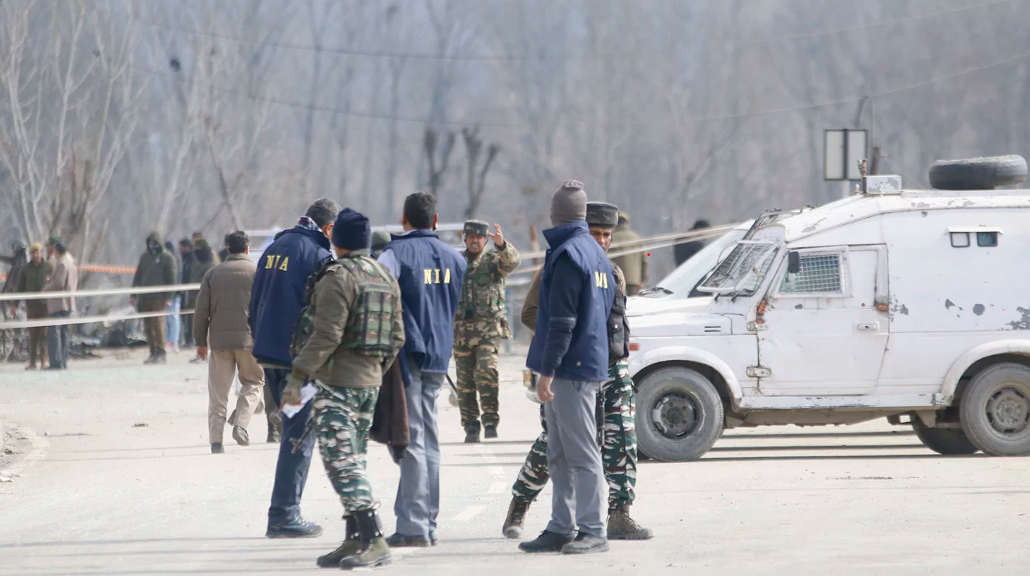The strategic defence ties between India and Israel are coming to fruition as India has reportedly borrowed heavily from the Israeli war manuals as well as used Israeli bombs in the latest escalation with Pakistan. In light of this, we are sharing an article highlighting the dangerous implications of this alliance. This first appeared in Newsclick on February 23.
 File Photo: Pulwama Gound Zero: NIA Probes 25km Span on Highway
File Photo: Pulwama Gound Zero: NIA Probes 25km Span on Highway
The recent suicide bomb attack on armed forces in Pulwama, in South Kashmir, has led to an array of responses ranging from cries for war to calls for maintaining peace. The virulent warmongering is going along with the assaults on Kashmiris as well as those criticising the ruling government’s failure in preventing the offensive that led to the death of at least 40 soldiers. Tensions with neighbouring Pakistan have been escalating. On Tuesday, UN Secretary General Antonio Guterres offered to broker peace between India and Pakistan, calling upon both the nations to de-escalate the situation.
In this sensitive situation, from within the pro-offensive camp, Israel is being held up as an example of the direction in which India should go. While one analyst urged that India learn from Israel and, “be proactive, not reactive, and take the battle into the enemy’s camp”, the editor of a news website surmised: ‘If India wants to behave like Israel, then it will have to build capacity, and hit out at Pakistan across the world.’ In pattern and content, these opinions are not very different from WhatsApp forwards circulating around, that too admonish India for not being aggressive enough, and glorify Israel’s flagrant and criminal use of violence.
In the light of the attack, Israel’ ambassador to India, Ron Malka, who is retired from Israeli forces, asserted “there is no limit” to Israel’s assistance to India in defending itself from terrorism. And sure enough, Israel has been growing closer to India through military and security tie-ups. These ties are extremely useful for Israel: India has bought nearly 50 per cent of Israel’s weapons exports in the last four years. These purchases directly finance and sustain Israel’s military occupation of Palestine. In turn, India has been deploying Israel’s tactics of repression and surveillance against civilian agitations, especially in Kashmir.
Let us take a closer look at the Israel ‘model’ that is being invoked in pro-war sections. For the last 71 years, Israel has thrust a regime of settler-colonialism, apartheid and illegal occupation over Palestinians. The very establishment of Israel entailed ethnic cleansing of Palestinians. In 1967, it occupied West Bank, including East Jerusalem and Gaza. The besieged strip of Gaza has seen massacres every few years, the last one in 2014 in which over 1400 Palestinians were killed, a third of them children. Just in the last one year, Israel has killed over 200 Palestinians in Gaza, who have been participating in the Great Return March. In the West Bank, Israel maintains an illegal military occupation, creating Bantustans through checkpoints, illegal settlements and the apartheid wall. Israel’s impunity and its war crimes have been repeatedly condemned and called to account internationally.
Calling upon India to respond like Israel, is fundamentally asking for India to use state terror, observed Achin Vanaik, academic and nuclear disarmament and peace activist. He further noted that such calls reflect the selective attitude towards terror, condemning Pakistan for not acting against it, but encouraging the use of similar methods by India (and Israel). Significantly, what binds Israel and the Modi government today is their ideological alliance on Zionism and Hindutva – both being exclusivist, supremacist ideologies that thrive on Islamophobia.
When the Israeli style of military operation is invoked, it is war crimes that are being called for. In reference to hostilities with Lebanon, the document on Dahiya Doctrine was published by a security think tank located in Tel Aviv University. It outlines the Israeli policy of disproportionate use of force.An Israeli general, speaking about Dahiya Doctrine said,
We will wield disproportionate power against every village from which shots are fired on Israel, and cause immense damage and destruction. From our perspective, these are military bases… This isn’t a suggestion. This is a plan that has already been authorized.’
It is necessary, more than ever, that the forces that are working to restore peace and resisting the warmongering and targeted attacks on ordinary Kashmiris in the wake of the Pulwama incident also build the struggle against ‘Israelisation’ of India. Military ties with Israel not only support its criminal regime over Palestinians, they also facilitate the import of Israeli methodology and ideology of war and repression. The Palestinian ‘Boycott, Divestment and Sanctions (BDS)’ movement has called for a military embargo on Israel until it respects Palestinian human rights, a demand that is being echoed globally. In Latin America, which has a long history of Israel supporting dictatorships through the 20th century, people’s struggles have come together against Israel’s military occupation of Palestine, and its linkages to the militarisation of their lives. It is time we borrowed a leaf from this book of building joint struggles against militarism.
Read more:
Netanyahu Scheduled to Visit India Again: Gearing Up for Elections with a Dose of Zionism?
#NotoNetanyahu No to complicity with Israel’s ApartheidWhy Asking Bands to Not Perform in Israel is Not an Attack on Freedom of Speech and Expression




